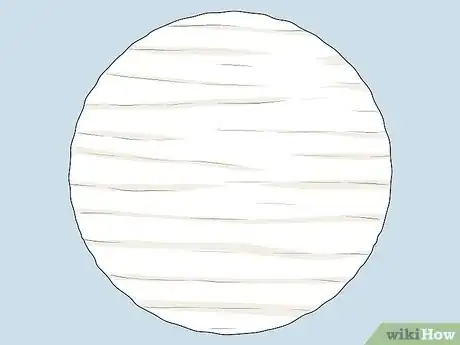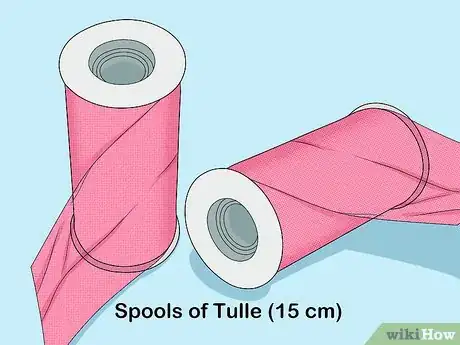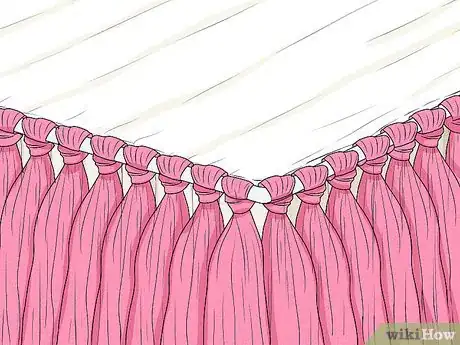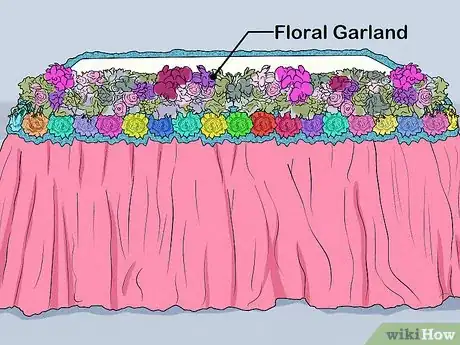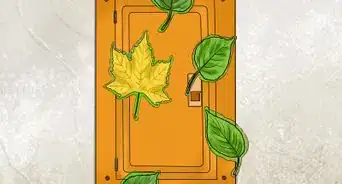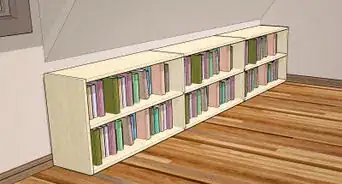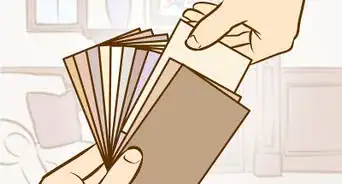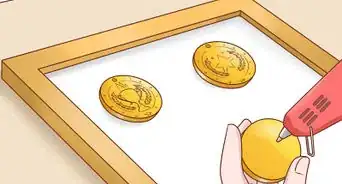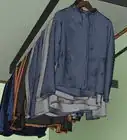This article was co-authored by wikiHow Staff. Our trained team of editors and researchers validate articles for accuracy and comprehensiveness. wikiHow's Content Management Team carefully monitors the work from our editorial staff to ensure that each article is backed by trusted research and meets our high quality standards.
This article has been viewed 30,398 times.
Learn more...
Tulle is such an expensive material, but you can use it to create a truly magical display for your table. Whether it is for a wedding, graduation, or quinceañera, tulle can take your table to the next level. Once you have the base down, you can make it even more special by adding lights, garlands, or a chiffon flower trim.
Steps
Placing the Tablecloth and Lights
-
1Choose a solid-colored tablecloth to use as your base. Even though you’ll be adding tulle, you still want something on your table to cover the top and sides. You can use a fabric tablecloth or a plastic one, but it needs to be solid-colored. The color can match the tulle that you will be using, or it can coordinate with it.[1]
- For example, you can use a white tablecloth with white tulle, or you can pair a white tablecloth with pink tulle.
- Match the tablecloth shape to the table. Use a round tablecloth for a round table, and a rectangular tablecloth for a rectangular table.
- Make sure that the tablecloth is big enough to reach the floor. If you need to, use 2 or more tablecloths.
-
2Drape the tablecloth over the table. Smooth out any wrinkles, and make sure that it is centered. Don’t worry about the tablecloth sliding around; you will be wrapping things around the tabletop, which will help hold it in place.
- If you are worried about the tablecloth slipping, secure it to the table with strips of double-sided tape. Put these on before you add the tablecloth.
- If your fabric tablecloth is wrinkled, be sure to iron it. Use a heat setting that is suitable for the fabric.
Advertisement -
3Get a strand of string lights if you want a more magical display. Regular string lights will work, but you will need to droop the strand every 6 to 12 inches (15 to 30 cm) so that the sides of the tablecloth are covered. Match the wire color to the tablecloth, or stick with gold or silver wire. Other great options include:
- Battery-operated string lights: these are great for tables that won’t be against a wall or near an outlet.
- Icicle lights: they typically need to be plugged in, but at least you won't have to droop the strand every 6 to 12 inches (15 to 30 cm).
- Netted lights: used for shrubs, they are a great if you want a lot of lights. Depending on the table's size, you may need several panels.
-
4Secure the lights to the table with clear packaging tape. Starting at a table corner, begin wrapping the lights around the tabletop’s edge. Secure the wire to the tablecloth with clear packaging tape every 6 to 12 inches (15 to 30 cm) so that it doesn't slide off.
- If you are using regular string lights, droop the wire by 6 to 12 inches (15 to 30 cm) so that you cover more surface area. If you don't, the top of the tutu will cover them.
- If you are using battery-operated lights, strap the battery pack to the bottom of the table leg, just below the tablecloth. Don't turn them on yet to save battery power.
- If you are using plug-in lights, make sure that there is an outlet nearby. You don’t have to plug them in yet.
Creating a Table Tutu
-
1Measure the circumference of your table. Use a measuring tape to measure all 4 sides of your table, then add them together. This will tell you how much elastic you will need to buy. You will need to buy enough elastic for all 4 sides of your table, even if it will be up against a wall.
- If your table is circular, wrap the measuring tape around the perimeter.
-
2Wrap elastic around the table and secure it in the back. Wrap 5⁄8 in (1.6 cm) wide elastic around the edge of your table. Tie the ends together in the back of the table with a double-knot, or overlap them and secure them with a pin. Pin the elastic to the tablecloth every 6 to 12 inches (15 to 30 cm) so that it doesn't slide off.[2]
- Match the elastic color to the tulle. Fold-over elastic is a great option because it comes in many colors.
- Wrap the elastic tightly enough so that it doesn't slide off, but loose enough so that you can still slide your finger under it.
-
3Purchase some spools of tulle. They are about 6 inches (15 cm) wide, and you can find them near the ribbon or wedding section of a craft or fabric store. If you can't find any, buy regular tulle off the bolt at a fabric store, then cut it into 6 in (15 cm) wide strips. Plan on getting 2 to 3 spools that are 100 yards (91 m) each.[3]
- You can use all 1 color, or you can use multiple colors for a more interesting effect. For example, you can use light pink and dark pink instead of just light pink.
- Try a rainbow of colors: pink, orange, pastel yellow, mint green, pale blue, and light purple.
- For a more magical display, consider using sparkly or glittery tulle.
-
4Cut your tulle into strips that are twice the height of your table. Measure the height of your table first, from the floor all the way to the table top. Double your measurement, then cut your tulle into strips that match that length.[4]
- How many strips you cut depends on how much coverage you want on your table. Cut just a few for right now.
- Cut a piece of cardboard to the height of your table. Wrap the tulle around it, then cut the bottom edge to separate the strands.
-
5Secure the first strip to the elastic with a slip-knot. Take 1 strip and fold it in half so that the narrow ends match up. Slide the folded end behind the elastic to make a loop, then pull the 2 tulle tails through the loop to tighten the knot.[5]
- Make sure that the folded end is pointing down when you slide it behind the elastic, not up.
- The tighter you make the knot, the fuller your tutu will be.
-
6Continue to tie the tulle strips around the table until the elastic is full. Make sure that the knots are touching each other. If you leave too much space between the knots, your table tutu won't be very full.[6]
- If you run out of strips, cut some more.
- If the table will be against a wall, you only need to cover the sides that will be visible.
- If a pin gets in the way, you may need to move it.
Decorating the Tutu's Top Edge
-
1Wrap satin ribbon around the top edge for a simple look. Choose a ribbon color that goes well with your table. Measure the circumference of your table, then cut the ribbon accordingly. Wrap the ribbon around the tabletop so that it covers the knots. Use a drop of hot glue or fabric glue every 6 to 12 inches (15 to 30 cm) to secure the ribbon to the tutu.
- Make sure that the ends of the ribbon are in the back of the table.
- Match the color to the tutu or the tablecloth. You can also use a darker shade than the tutu (i.e.: dark pink ribbon for a light pink tutu).
- Choose a ribbon that is wide enough to cover the knots. Something that is at least 1 inch (2.5 cm) will work fine, but you can go wider.
-
2Use a chiffon flower trim instead if you want a girly look. Measure the circumference of your table, then cut some chiffon flower trim to that length. Glue the trim around the edge of the table to hide the knots from the tulle. You can use fabric glue or hot glue for this.[7]
- For a non-permanent option, use pins instead. The bulk of the flowers should help hide the pins.
- Choose a trim that is wide enough to cover the knots. It can be the same color as the tulle and/or tablecloth, or a coordinating color.
- You can find this trim at a fabric store's trim and ribbon section. Some craft stores may sell ribbon that looks similar.
-
3Upgrade a ribbon or flower trim with glittery silhouettes, if desired. Wrap your ribbon or chiffon flower trim around the table first. Next, use a stencil to trace shapes onto the back of glittery scrapbooking paper. Cut the shapes out, then secure them to the trim with hot glue or fabric glue.
- Use shapes and colors that match your theme. For example, use princess crowns for a princess party, or hearts for a wedding.
- The shapes should be around 6 to 8 inches (15 to 20 cm) tall.
- Don't get carried away. You only need 1 shape at each corner, and 1 shape in the middle.
-
4Wrap a floral garland around the tabletop if you want a forest look. Measure the circumference of your table, then buy a floral garland that’s close to that length. Cut the garland shorter, if needed, then wrap it around the tabletop. Use T-shaped floral pins to secure it to the tutu, making sure that you go through the tulle, elastic, and tablecloth. Again, if the table is against a wall, you only need to cover 3 sides.
- For a fairy look, use a garland with flowers; they can have some green leaves too. Make sure that the colors go well with your tutu.
- For a fall look, use a garland made from maple leaves in reds, oranges, and yellows.
- For a forest or garden look, stick with a green garland--ferns would look lovely, but you can also use ivy or evergreen.
-
5Create a fancier look with a scalloped fabric tablecloth. Finish your tutu first, then drape a second, solid-colored tablecloth over your table. Starting at a corner, gather the bottom edge of the tablecloth, and secure it to the top edge of the tutu with a safety pin. Do this a few more times along the edges of your table until you get the look you want.
- A plain fabric tablecloth would work fine, but a nicer fabric, such as velvet, would work better. Don’t use plastic.
- Cover the safety pins with large, silk flowers or satin ribbon bows.
- Alternatively, wrap the fabric around the edges of the table instead. This way, the top of the table will be exposed.
- Use a different color or shade from the tutu. For example, you can use dark blue for a light blue tutu, or purple for a pink tutu.
-
6Use beaded garlands instead of fabric as an alternative. Wrap a beaded pearl garland around the top edge of your table. Safety pin it at each corner and every 12 to 24 inches (30 to 61 cm). Let the garland droop a little between each pin to create a scalloped look.
- You can do this in addition to fabric scallops for an even fancier look. Make the beaded scallops droop lower than the fabric ones.
Things You'll Need
- Table
- Solid-colored tablecloth
- 2 spools of tulle
- 5⁄8 inch (1.6 cm) fold-over elastic
- Hot glue or fabric glue
- Safety pins or sewing pins
- Scissors
- String lights (optional)
- Clear packaging tape (for string lights)
- Ribbon, chiffon flower trim, or garlands (optional)
References
- ↑ https://www.catchmyparty.com/blog/no-sew-tulle-table-skirt-diy-tutorial
- ↑ https://www.catchmyparty.com/blog/no-sew-tulle-table-skirt-diy-tutorial
- ↑ https://www.catchmyparty.com/blog/no-sew-tulle-table-skirt-diy-tutorial
- ↑ https://www.catchmyparty.com/blog/no-sew-tulle-table-skirt-diy-tutorial
- ↑ https://www.catchmyparty.com/blog/no-sew-tulle-table-skirt-diy-tutorial
- ↑ https://www.catchmyparty.com/blog/no-sew-tulle-table-skirt-diy-tutorial
- ↑ https://www.catchmyparty.com/blog/no-sew-tulle-table-skirt-diy-tutorial
- ↑ https://ourpastimes.com/how-to-decorate-tables-with-tulle-and-lights-12581685.html
- ↑ https://www.brit.co/tulle-diys/
About This Article
To decorate a table with tulle, put a solid-colored tablecloth onto the table, and wrap an elastic band around the table. Then, cut the tulle to twice the height of the table and tie it in the middle to the elastic band. Repeat that process until the entire table’s circumference has been completed. Then, wrap a satin ribbon around the elastic band to hide it and make it look more professional. Keep reading to learn how to hide that elastic band in more festive ways!
